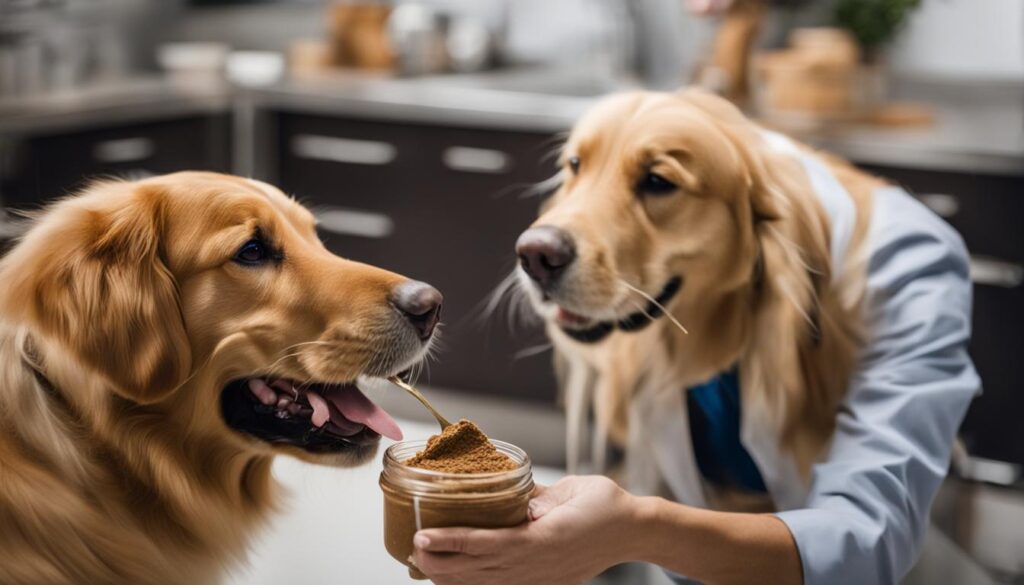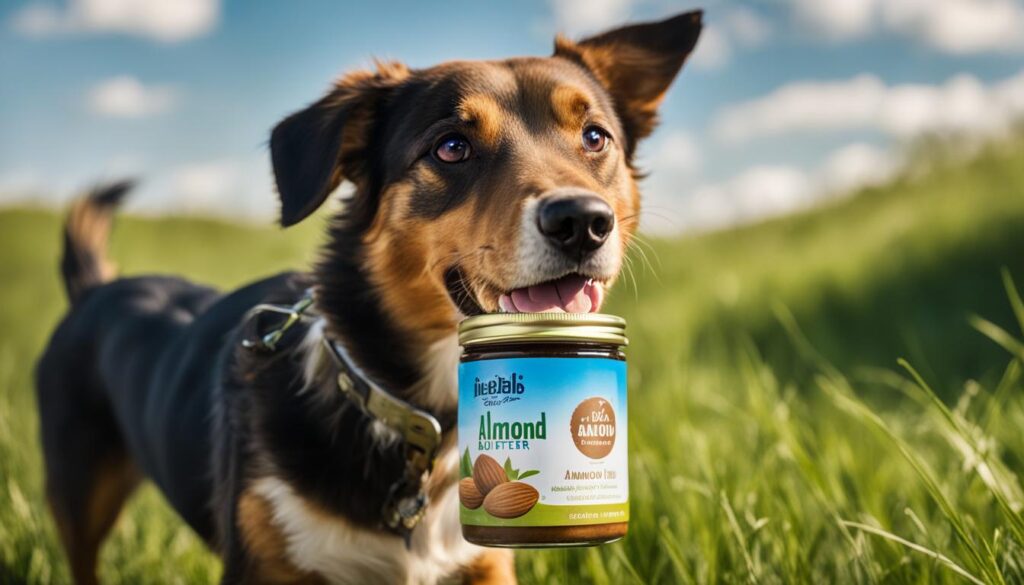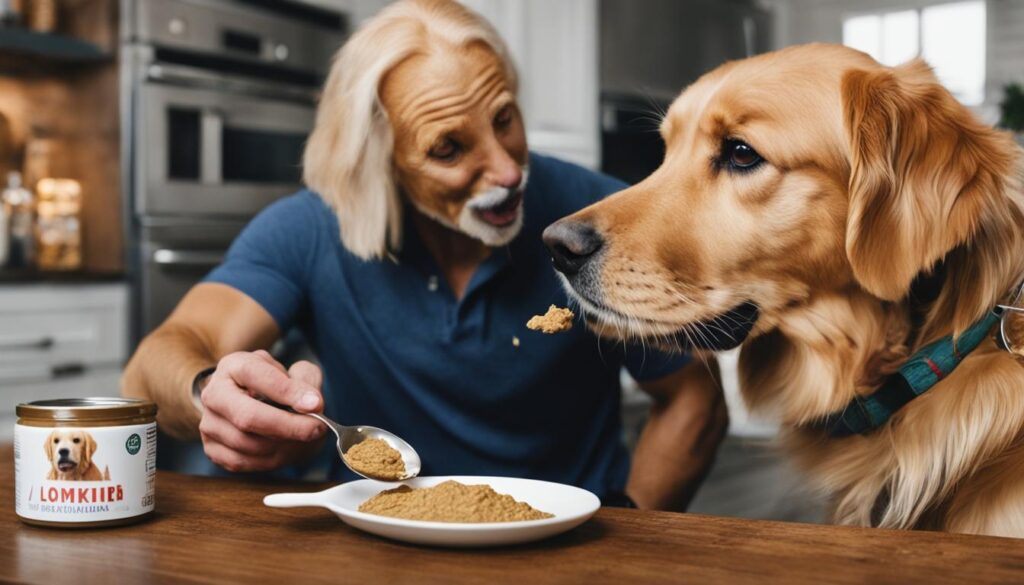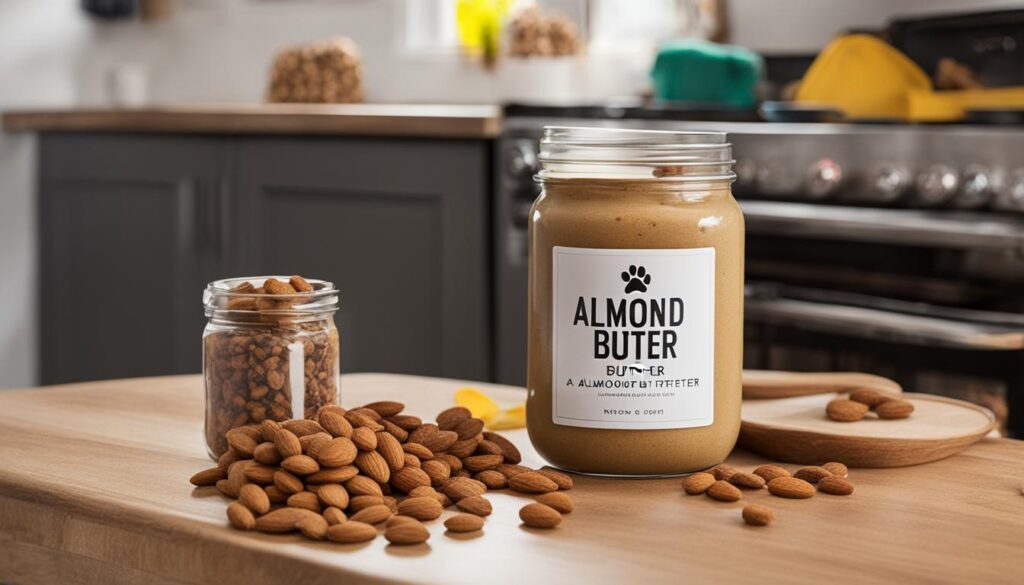As a responsible pet owner, I understand the importance of feeding my dog a balanced diet that meets their nutritional needs. But when it comes to sharing human foods with our furry friends, it’s essential to tread carefully to ensure their safety and well-being. One common question that arises is whether dogs can eat almond butter. In this article, I will provide vet-approved advice on the topic and explore the benefits, potential risks, and safe ways to incorporate almond butter into a dog’s diet.
Key Takeaways:
- Almond butter can be safe for dogs in small amounts.
- Check the ingredients for additives like xylitol, which is toxic to dogs.
- Almond butter contains essential nutrients that can benefit a dog’s health.
- Excessive consumption of almond butter can lead to digestive issues and other health problems.
- Consult a veterinarian before introducing almond butter or any new food to your dog’s diet.
Is Almond Butter Safe for Dogs?

When it comes to almond butter, many dog owners wonder if it’s safe to share this delicious treat with their furry companions. The good news is that natural almond butter is generally safe for dogs to consume in moderation. Unlike other nuts, almonds are not toxic to dogs. However, it’s important to note that each dog’s digestive system is unique, so it’s crucial to monitor their reaction when introducing almond butter into their diet.
Avoid Almond Butter with Additives
When choosing almond butter for your dog, it’s essential to opt for natural varieties without any added sugars or artificial sweeteners. One particular ingredient to watch out for is xylitol, which is highly toxic to dogs. Xylitol is a common sweetener found in some almond butter brands and can cause life-threatening complications if ingested by dogs. Always read the labels and ensure that the almond butter you choose is free from harmful additives.
Benefits of Almond Butter for Dogs
While safety is important, it’s also worth noting the potential benefits of almond butter for dogs. Almond butter contains essential nutrients like magnesium, calcium, vitamin B, and vitamin E, which can support your dog’s bone health, muscle function, and overall well-being. Additionally, almond butter contains antioxidant compounds that contribute to their overall health and vitality.
How to Feed Almond Butter to Dogs
When introducing almond butter to your dog’s diet, start with small amounts to assess their tolerance. You can incorporate almond butter into homemade dog treats or mix it with other dog-friendly ingredients to create a nutritious snack. Remember, moderation is key, and almond butter should only be given to dogs as an occasional treat.
| Safe Ways to Feed Almond Butter to Dogs | Avoid |
|---|---|
| ✓ Incorporating almond butter into homemade dog treats | ✗ Giving large quantities of almond butter |
| ✓ Mixing almond butter with dog-friendly ingredients | ✗ Serving almond butter with xylitol or other additives |
| ✓ Occasional treats with small amounts of almond butter | ✗ Feeding almond butter as a primary source of nutrition |
It’s important to note that while almond butter is generally safe for dogs, not all dogs may tolerate it well. Some dogs may have allergies to almonds or almond butter, so it’s crucial to observe your dog for any signs of allergic reactions such as itching, vomiting, or diarrhea. If you notice any adverse effects, consult your veterinarian for further guidance.
In conclusion, natural almond butter can be a safe and healthy occasional treat for dogs. By choosing natural varieties without additives and feeding it in moderation, you can share the joy of almond butter with your furry friend while ensuring their well-being.
Health Benefits of Almond Butter for Dogs

Almond butter offers several health benefits for dogs, making it a nutritious addition to their diet. It contains essential nutrients such as magnesium, calcium, vitamin B, and vitamin E, which contribute to their overall well-being. These nutrients are vital for maintaining strong bones and muscles, supporting their immune system, and promoting optimal health.
In addition to these essential nutrients, almond butter also contains antioxidant compounds that provide further health benefits for dogs. Antioxidants help combat free radicals in their bodies, reducing the risk of chronic diseases and promoting overall wellness.
It’s important to note that while almond butter can be beneficial for dogs, it should be given in moderation. Too much almond butter can lead to weight gain and digestive issues. Therefore, it’s crucial to consider portion sizes and integrate it into their diet as an occasional treat rather than a regular staple.
Almond Butter Nutritional Breakdown
| Nutrient | Amount per serving (2 tablespoons) |
|---|---|
| Magnesium | 112 mg |
| Calcium | 112 mg |
| Vitamin B | 0.49 mg |
| Vitamin E | 7.27 mg |
| Antioxidants | Varying levels |
Providing your dog with almond butter can be a healthy and enjoyable experience, but it’s always best to consult with your veterinarian before introducing any new food to their diet. They can offer personalized guidance based on your dog’s specific needs and health conditions. Overall, when given in moderation, almond butter can be a tasty and beneficial treat for your furry companion.
Potential Risks of Almond Butter for Dogs
While almond butter can be a tasty treat for dogs, it’s important to be aware of the potential risks associated with feeding them this nutty spread. Dogs have different digestive systems than humans, and certain aspects of almond butter can pose dangers to their health if not managed properly.
One of the primary concerns with almond butter is its high fat content. Dogs have sensitive stomachs and may struggle to digest large amounts of fat, leading to various digestive issues. Excessive consumption of fatty foods, including almond butter, can increase the risk of pancreatitis and hypoglycemia in dogs.
Another hazard to consider is the possibility of choking. Whole nuts, including almonds, can pose a choking hazard to dogs, especially smaller breeds or those prone to gulping their food. It is crucial to prevent dogs from consuming whole almonds or almond butter with large nut fragments to avoid this potential risk.
As a responsible pet owner, it’s essential to prioritize your dog’s health and well-being. Moderation is key when it comes to feeding almond butter to dogs. While small amounts can be a safe treat, it’s important to ensure it is given in moderation and as part of a balanced diet.
In the next section, we will explore the nuts and nut butters that are particularly dangerous for dogs, shedding light on what to avoid when sharing nutty snacks with your furry friend.
| Potential Risks of Almond Butter for Dogs | Action to Take |
|---|---|
| High fat content | Feed almond butter in moderation to prevent digestive issues and health complications. |
| Possible choking hazard | Avoid giving whole almonds or almond butter with large nut fragments to prevent choking incidents. |
Nuts and Nut Butters to Avoid Giving Dogs

When it comes to feeding our furry friends, it’s important to be aware that not all nuts are safe for dogs to consume. Some nuts can be dangerous and toxic, causing a range of health issues. Here are some nuts and nut butters that you should avoid feeding your dogs:
- Pecans: Pecans can cause digestive problems and pancreatitis in dogs. They contain substances that can lead to toxicity, affecting their organs.
- Pistachios: The high-fat content of pistachios can lead to upset stomachs, vomiting, and diarrhea in dogs. In some cases, it can also cause pancreatitis.
- Macadamia nuts: Macadamia nuts are particularly toxic to dogs, causing muscle tremors, weakness, and even paralysis. It’s essential to avoid giving any amount of macadamia nuts to dogs.
- Walnuts: While walnuts are not toxic to dogs, they can cause gastric upset and even obstruction if dogs consume the shell. Additionally, moldy walnuts can produce toxins harmful to dogs.
It’s important to note that these are just some examples, and there are other nuts that can also be harmful to dogs. When it comes to nut butters, it’s crucial to read the labels and ensure they do not contain any of these dangerous nuts. Remember, a small amount of these nuts or nut butters can have serious consequences for your canine companion’s health.
Why are these nuts dangerous for dogs?
The nuts mentioned above can be harmful to dogs due to various reasons. They may contain substances like certain fatty acids, toxins, or mold that dogs cannot tolerate. These substances can lead to gastrointestinal problems, organ failure, seizures, and other serious health issues. Additionally, some nuts may pose a choking hazard due to their size or shape.
To drive home the importance of avoiding these nuts, here’s a table summarizing the dangers of these nuts for dogs:
| Nut | Dangers for Dogs |
|---|---|
| Pecans | Can cause digestive problems, pancreatitis, organ toxicity |
| Pistachios | High-fat content can result in upset stomach, vomiting, diarrhea, and pancreatitis |
| Macadamia nuts | Can lead to muscle tremors, weakness, paralysis |
| Walnuts | Possible gastric upset, obstruction from shells, toxicity of moldy nuts |
How to Safely Feed Almond Butter to Dogs

Feeding almond butter to dogs can be a delicious and nutritious treat, but it’s important to do so with caution to ensure their safety and well-being. Here are some safe ways to give dogs almond butter:
- Start with small amounts: When introducing almond butter to your dog, start with a small dollop or a lick to see how they react. Monitor them closely for any signs of discomfort or adverse reactions.
- Avoid additives: Choose almond butter that is free from added sugars or artificial sweeteners. These additives can be harmful to dogs and may cause digestive issues.
- Incorporate into homemade treats: You can incorporate almond butter into homemade dog treats or recipes. This allows you to control the ingredients and ensure that there are no harmful additives.
- Mix with dog-friendly ingredients: You can mix almond butter with other dog-friendly ingredients like plain yogurt, mashed banana, or pumpkin puree to create a nutritious and tasty snack. Just make sure that all the ingredients are safe for dogs.
Remember, almond butter should only be given to dogs in moderation as an occasional treat. It should not replace their regular balanced diet. If you have any concerns or questions about feeding almond butter to your dog, consult with a veterinarian for personalized advice.
| Safe Ways to Feed Almond Butter to Dogs | Unsafe Ways to Feed Almond Butter to Dogs |
|---|---|
| Small amounts | Large quantities |
| Almond butter without additives | Almond butter with added sugars or artificial sweeteners |
| Incorporating into homemade treats | Feeding almond butter directly from the jar |
| Mixing with dog-friendly ingredients | Mixing with ingredients that are toxic to dogs |
Allergies and Almond Butter for Dogs
While almond butter is generally safe for dogs, it’s important to be aware that some dogs may develop allergies to almonds or almond butter. Although allergies to almonds are rare in dogs, it’s crucial to introduce new foods gradually and observe any signs of allergic reactions. If your dog shows symptoms such as itching, vomiting, or diarrhea after consuming almond butter, it’s recommended to consult a veterinarian for further evaluation and guidance.
Allergic reactions in dogs can vary in severity, ranging from mild discomfort to life-threatening situations. Identifying and managing allergies promptly is essential to ensure the well-being of your furry friend. It’s important to note that dogs can develop allergies to any food, including almond butter, regardless of its nutritional value. Every dog’s immune system reacts differently, and individual sensitivities may vary.
Common symptoms of almond butter allergies in dogs may include:
- Itching and skin irritation
- Hives or swelling
- Ear infections
- Gastrointestinal upset (vomiting and diarrhea)
If you suspect that your dog has an allergy to almond butter or any other food, it’s best to consult a veterinarian. Do not attempt to diagnose or treat allergies in your dog without professional guidance. A veterinarian will conduct a thorough examination, consider your dog’s medical history, and recommend appropriate diagnostic tests if necessary.
Additionally, your veterinarian may suggest an elimination diet or allergy testing to identify the specific allergens affecting your dog. These assessments can help determine if almond butter or other ingredients are the cause of your dog’s allergic reactions.
Remember, prevention is key when it comes to managing allergies in dogs. While almond butter can be a tasty treat, it’s important to prioritize your dog’s health and well-being. If your dog is allergic to almonds or almond butter, there are many other safe and delicious treats available that won’t cause an allergic reaction.
Homemade Almond Butter for Dogs

Making your own almond butter for dogs is a great way to ensure their safety and well-being. By preparing it at home, you have full control over the ingredients and can avoid any harmful additives that may be present in commercial versions. This allows you to provide a healthier and safer option for your furry friend.
When making almond butter for dogs, it’s important to select high-quality almonds that are free from any potential contaminants. Organic almonds are a good choice, as they are grown without the use of pesticides or other harmful chemicals. Additionally, it’s best to opt for unsalted almonds to avoid adding unnecessary sodium to your homemade butter.
The process of making almond butter is relatively simple. Start by roasting the almonds in the oven at a low temperature to enhance their flavor. Once cooled, place the almonds in a food processor or blender and blend until they reach a smooth and creamy consistency. You may need to scrape down the sides of the processor or blender a few times during this process to ensure an even blend.
“Making homemade almond butter for dogs allows you to create a wholesome and nutritious treat without any questionable additives. It’s a great way to prioritize your dog’s health and well-being.”
For added variety and nutritional benefits, you can experiment with different ingredients while making almond butter. Consider adding a small amount of coconut oil for its healthy fats and flavor. You can also include other dog-friendly ingredients like pumpkin puree or plain yogurt to create a unique and delicious almond butter blend that your dog will love.
Once your homemade almond butter is ready, store it in an airtight container in the refrigerator. This will help maintain its freshness and prevent it from spoiling. It’s important to note that homemade almond butter does not have the same shelf life as store-bought varieties, so it’s best to make smaller batches and use it within a reasonable timeframe.
Remember to introduce almond butter to your dog’s diet gradually, especially if it’s their first time trying it. Start with small amounts and monitor their reaction. If you notice any signs of digestive upset or allergies, discontinue use and consult with your veterinarian.
Making your own almond butter for dogs provides numerous benefits. It allows you to customize the ingredients to suit your dog’s specific dietary needs, ensures that no harmful additives are present, and gives you peace of mind knowing exactly what goes into your furry friend’s treat. So why not give it a try and delight your dog with a homemade almond butter that’s made with love?
Moderation and Almond Butter for Dogs

When it comes to feeding dogs almond butter, moderation is key. While almond butter can be a tasty and nutritious treat for dogs, it should be given in small amounts and not as a part of their daily diet.
Feeding dogs excessive or large servings of almond butter can lead to digestive issues, weight gain, and potential health risks. It’s important to remember that dogs have different calorie requirements and nutritional needs than humans.
To determine the appropriate serving size for your dog, you should consider their size, activity level, and overall calorie intake. As a general guideline, almond butter should not exceed 10% of your dog’s total daily calorie intake.
When feeding almond butter to your dog, it’s important to balance it with other nutritious foods that provide a well-rounded diet. Too much almond butter can result in an unbalanced diet and potential nutrient deficiencies.
Monitoring portion sizes is crucial to prevent any adverse effects. Keep in mind that almond butter is high in fat, and consuming excessive amounts can lead to pancreatitis and other health issues in dogs.
To ensure a healthy and safe experience, consider consulting with your veterinarian about the appropriate serving size of almond butter for your dog. They can provide personalized advice based on your dog’s specific needs, taking into account their age, weight, and any underlying health conditions.
Tips for Feeding Almond Butter to Dogs in Moderation:
- Use almond butter as an occasional treat, not as a regular part of your dog’s diet.
- Introduce almond butter gradually and monitor your dog’s reaction.
- Avoid almond butter with added sugars, artificial sweeteners, or other harmful additives.
- Consider incorporating almond butter into homemade dog treats or mixing it with other dog-friendly ingredients for added nutrition.
- Always offer fresh, clean water to your dog after feeding them almond butter.
Almond Butter Serving Size Guide:
| Dog Size | Recommended Serving Size |
|---|---|
| Small Dogs (up to 20 lbs) | 1 teaspoon to 1 tablespoon |
| Medium Dogs (20 – 50 lbs) | 1 to 2 tablespoons |
| Large Dogs (50 – 100 lbs) | 2 to 3 tablespoons |
| Extra Large Dogs (over 100 lbs) | 3 tablespoons or more |
Remember, these serving sizes are general guidelines, and it’s important to consider your dog’s individual needs. Always observe your dog’s response and adjust the serving size accordingly.
Feeding your dog almond butter in moderation can be a safe and enjoyable treat. Just make sure to monitor portion sizes, prioritize a balanced diet, and consult with your veterinarian for personalized advice.
Consulting a Veterinarian and Pet Insurance
When it comes to introducing new foods like almond butter to your dog’s diet, it’s always a good idea to consult with a veterinarian. They have the expertise to assess your dog’s unique needs and health conditions, and can provide personalized advice on whether almond butter is suitable for your furry friend.
A veterinarian can guide you on the proper serving size for your dog, taking into account their size, weight, age, and any existing medical conditions. They can also advise you on how frequently you can give almond butter to your dog, ensuring it remains a healthy and occasional treat.
Additionally, having pet insurance can provide peace of mind when introducing new foods to your dog. While almond butter is generally safe for dogs, there is always a possibility of unexpected reactions or digestive issues. Pet insurance can help cover any veterinary expenses that may arise from these situations, making it easier to address any concerns promptly.
Remember, each dog is unique, and what works for one may not work for another. Consulting a veterinarian and having pet insurance can help ensure that your dog’s health and well-being are prioritized when introducing new foods like almond butter into their diet.
| Benefits of Consulting a Veterinarian: | Benefits of Pet Insurance for New Food Introductions: |
|---|---|
|
|
Wrapping Up
After evaluating the safety and benefits of almond butter for dogs, it can be concluded that almond butter can be a safe and nutritious occasional treat for our furry friends. However, it is crucial to give it in moderation and be mindful of the ingredients.
When choosing almond butter for dogs, it is important to select natural and organic options without any harmful additives. Avoid almond butter that contains xylitol, as it is highly toxic to dogs.
Remember, every dog is unique, and their digestive systems may react differently. It is essential to closely monitor your dog’s reaction when introducing almond butter into their diet. If you notice any signs of discomfort or allergic reactions, consult a veterinarian for guidance.
In summary, almond butter can provide health benefits for dogs, such as essential nutrients and antioxidants. However, it should be given in moderation, and pet owners should prioritize their dog’s overall balanced diet and consult a veterinarian for personalized advice.
FAQ
Is almond butter safe for dogs?
Yes, almond butter is generally safe for dogs to consume in moderation. However, it’s important to check the ingredients for additives like xylitol and avoid serving large amounts to prevent digestive issues.
What are the health benefits of almond butter for dogs?
Almond butter contains essential nutrients like magnesium, calcium, vitamin B, and vitamin E, which are beneficial for dogs’ bones, muscles, and overall health. It also contains antioxidant compounds that support overall well-being.
Are there any potential risks associated with almond butter for dogs?
While almond butter is generally safe, it is high in fat and can be difficult for some dogs to digest. Consuming excessive amounts of fatty foods like almond butter can lead to pancreatitis and hypoglycemia. Additionally, whole nuts present a choking hazard for dogs.
Are there any nuts or nut butters that dogs should avoid?
Yes, some nuts like pecans, pistachios, macadamia nuts, and walnuts are harmful to dogs and can cause gastrointestinal issues, organ failure, seizures, and other health problems. It’s important to avoid giving these nuts or nut butters containing them to dogs.
How should almond butter be safely fed to dogs?
When feeding almond butter to dogs, it’s essential to do so in small amounts and monitor their reaction. Avoid almond butter with added sugars or artificial sweeteners. It can be incorporated into homemade dog treats or mixed with other dog-friendly ingredients for a nutritious snack.
Can dogs be allergic to almond butter?
While rare, some dogs may have allergies to almonds or almond butter. It’s important to introduce new foods gradually and observe any signs of allergic reactions. If your dog shows symptoms like itching, vomiting, or diarrhea, consult a veterinarian.
Can I make almond butter at home for my dog?
Yes, making your own almond butter for dogs ensures that you know all the ingredients and can avoid harmful additives. It allows you to control the amount of fat and other ingredients, making it a safer option for your furry friend.
How much almond butter can dogs have?
Almond butter should be given to dogs in moderation as an occasional treat. It should not exceed 10% of their total daily calorie intake and should be balanced with other nutritious foods. Monitoring portion sizes is crucial to prevent digestive issues and weight gain.
Should I consult a veterinarian before introducing almond butter to my dog’s diet?
Yes, before introducing new foods like almond butter to your dog’s diet, it’s important to consult with a veterinarian. They can provide personalized advice based on your dog’s specific needs and health conditions. Having pet insurance can help cover any potential vet visits related to trying new foods.






